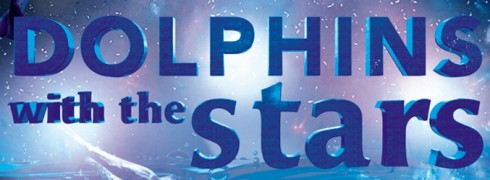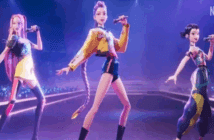Secuoya Content Distribution’s format The Shower was quite a sensation at MIPTV this year.
What better indicators than MIPTV’s most-discussed shows to tell us where the TV industry is headed? In any case, the market remains the ideal place to discover the funniest, most original and sometimes weirdest TV trends from all around the globe (a great selection by THE WIT was presented April 7, in Virginia Mouseler’s packed-as-ever session).
One of today’s big trends seems to be mixing well-known competition formats with… unexpected elements, be it tech enhancements or new kinds of contestants. In Secuoya Content Distribution’s The Shower (photo above), contestants perform a song in a large shower onstage, and via a dedicated mobile app, the audience can lower the water temperature if unhappy with the candidates’ performance! In another genre, La Competencia/Televisa’s Dolphins with the Stars (photo below) offers viewers the opportunity to see celebrities and dolphins doing spectacular performances in and out of water.
Israel — a worldwide reference in terms of innovative TV formats — was the subject of several MIPTV focus sessions, including a keynote from Keshet Media Group’s CEO Avi Nir. The man behind Prisoners of War (the original Homeland) and Rising Star warned MIPTV-goers of the perils of resting on their laurels: “Disruptiveness cannot come if you’re complacent, if you feel like the winner. » More notable still were his views on TV audiences: « the viewer has many alternatives, he is very tech-savvy, he knows all the formulas, and he is a great decoder. You don’t want him to decode the shows you’re doing. A great story, a great format, is undecodable. » Watch the full session right here:
The thing is, innovative shows like Rising Star (for which audience members act as live judges via a mobile app, as explained in a MIPFormats case study – and see a video from the show below) tend to be less the norm today. Instead, we’re seeing more and more re-packagings of previously tried formats. This raises the question of their legitimacy on traditional networks. Wouldn’t The Shower and other « wacky » TV experiments be more successful if they were shown online first? As strategist and journalist Angela Natividad pointed out at the MIPTV Wrap session, « it’s too bad that some shows happen on TV first”, as we would be happy to discover it on YouTube, a platform where wacky shows are much more welcome.
As some shows become less and less relevant to broadcasters, we definitely saw a new trend emerge: what if TV had found a new niche segment in… pets? Even Discovery had done a deal with Dog TV, « the first channel in history that isn’t for people », according to its CCO Ron Levi, interviewed here. The channel was indeed conceived to make dogs « more relaxed, less stressed when they’re home alone »! Take a look and judge by yourselves:
When it comes to scripted shows, MIPTV showed us more than ever that stars don’t judge a script based on its origin any more: they fall in love with original projects and ideas, be they for TV or the cinema. That is, at least, what Ray Wise (who stars in fast-food restaurant chain Chipotle’s show Farmed & Dangerous) told us: « It was a great script, so I said yes – not even knowing that Chipotle was behind it! »
The same is true for Maggie Gyllenhaal, who talked about her upcoming show The Honourable Woman in these terms: « I read all of the scripts (eight episodes worth), and they were so unusually phenomenal that I had to do this.” Does cinema really belong to the past for more and more Hollywood stars? Watch our interview with Ray Wise right here:
Stars’ desire to do more TV may result from of the ever-increasing average quality of scripted shows, especially cable ones – as Starz’ CEO Chris Albrecht explained in his keynote, he came back to trusting the creatives behind a show, as « networks shouldn’t produce television series. Producers should produce television series. » Should we expect less and less shows on networks in the future, and more and more creativity on other platforms, such as Amazon (which asks its viewers to rate pilots)? « Clearly people are interested in original series, and original ideas and new work, and they really engage with that », said Amazon Studios’ director Roy Price.
Liveblog: Deb Roy (@dkroy) tells #MIPTV that ‘Twitter makes television better’ https://t.co/qMJotfQMHp @twittermedia pic.twitter.com/XHNg5Dhvwt
— MIP Markets (@mip) April 8, 2014
For Twitter‘s chief media scientist Deb Roy, engaged audiences rime with « the social soundtrack of TV »: as he pointed out in his visually impressive keynote (photo above), what makes the social media platform relevant to TV programming is that « it’s live, it’s public and it’s conversational. We use it in the moment to talk to everyone who cares to listen. » We may thus see more and more shows using it as a fundamental element…
As long as networks don’t make social media trends the very subjects of their shows! As Red Arrow creative partner Omri Marcus noted in the MIPTV Wrap session, at least six selfie- based programmes were on offer this market: « Many producers are just looking for the zeitgeist and turn in into a TV format – lazy creativity!” A lack of originality that may attract brands though: even Publicis’ CEO Maurice Levy praised selfies in his keynote, saying that Ellen DeGeneres’ Oscar selfie was now worth as much as $1 billion. So are we doomed to expect selfie-based formats in the future…?
See you at MIPCOM (13-16 October) to see if these trends are are here to stay!
Catch up on all of our MIPTV 2014 live coverage here; and watch full conference videos here.





